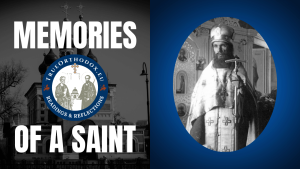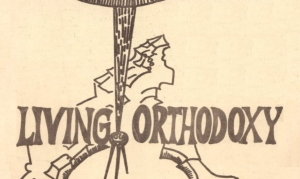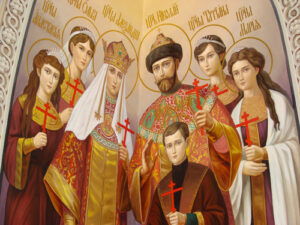Homily on the Seventh Anniversary of the Martyric End of Emperor Nicholas II and the Entire Royal Family by (later) Metropolitan Anastassy (Gribanovsky)

Seven years have passed since the day of the death of the royal martyrs, and we are offering on this universal altar the bloodless sacrifice in their memory.
The prayer of love is our constant obligation before them and their great sufferings which were crowned by the cruel execution of the entire Royal Family on this bloody night in Ekaterinburg.
The great struggle between good and evil which has required such a heavy sacrifice from Russia has not yet ended, and the name of the late tsar continues even to the present day to stand before us as a “sign which shall be spoken against.”
While at the very remembrance of this name some people shed tears of grief and compassion, others become furious and angrily cast poisoned darts at it.
Are not these latter so indignant with the martyred tsar because, having shed his blood, they are unable in any way to justify the crime they have committed?
All the contrivances of the tsar’s murderers have been proved powerless to obscure his moral image — that image which serves as a standard of a man’s true worth — whether he be the last to occupy the throne or drag out his pitiful existence among the lowly of the earth.
It is well known that people, like precious metals, are proven in the furnace of fiery trials. The late emperor passed through both the major kinds of temptations to which a man is subject on earth: the temptation of exaltation, fame, happiness, and the temptation of humiliation, deprivation, and bodily and spiritual suffering. It is hard to say which of these two paths of trial is more dangerous for us. It is not easy for a person to bear the knowledge of his superiority over other people and to withstand the intoxicating action of majesty, fame, and wealth which almost always come to him accompanied by their totally corrupting companion, the temptation of pride. But no lesser moral efforts are required of us to preserve a calm majesty of soul in the midst of burdensome griefs and misfortunes which befall us; this is when a man’s heart involuntarily either becomes embittered against the whole world or falls into despair.
The position of a monarch, and especially that of an autocratic one, conceals even more spiritual dangers within itself, since in his hands is concentrated the fullness of authority, power and the other earthly blessings connected with them which entice the majority of people.
For the master of millions of people the word “impossible” scarcely exists; his commands possess creative power. It is not in vain that flatterers ascribe almost divine attributes to these glorious and mighty ones of the earth.
The temptations of royal power are so great that in ancient Byzantium there existed a wise custom: in the midst of the noise and splendor of the coronation ceremony, when the excited crowd was applauding their crowned sovereign as some sort of demigod, the emperor was brought pieces of marble so that he could choose the material for his sarcophagus in advance, or else a sack of ashes was placed in his hands to remind him that he too would someday become dust and ashes like every other mortal.
The throne of the Russian tsar at the time that it was inherited by Emperor Nicholas II stood so high that it could be seen by the whole world, but its splendor did not for a minute blind the late tsar. The latter did not become intoxicated with the wine of authority, did not become carried away by his transient majesty; on the contrary, it would be more accurate to say he was burdened by the latter and could not overcome his innate feeling of modesty which often prevented him from exercising his authority to the extent sometimes required by the circumstances of the time. Nourished from childhood with the peace-making spirit of Orthodoxy, the tsar-martyr was also meek and humble of heart; he did not break the bruised reed, nor did he quench the smoking flax. Peace and love were the chief elements of his soul: he began his serene, as it seemed, and blessed reign with a summons to the world for peace, and when for the first time he saw himself forced to bare the sword for the defence of Russia, at first from external, and then from internal foes, his heart was involuntarily crushed with pain.
The tsar, not yet tested by experience, was constantly grieved that his magnanimous intentions were frustrated by the indomitable contradictions of life. Authority was to him not so much the joyful possibility of encouraging good, as the severe necessity of struggling with evil (Rom. 13:1-4), and while suffering within, he bore its burden with patient obedience as an obligation placed upon him from on high.
The tsar spent his moments of rest in the circle of his loving family, which lived in the humble, old Russian way of life in the midst of the surrounding external splendor.
The exalted spirit of self-sacrifice which burned in the hearts of the Russian people at the beginning of the World War again inspired the tsar. Aflame with the same sacred fire, he was united in spirit with his subjects, became an embodiment of the feelings of the whole nation, and became a true leader of the Fatherland.
These were undoubtedly some of the happiest days of his reign, when the testaments of his nation’s history were opened before him and he felt in his heart a mysterious voice calling him to the realization of the high calling of the Russian people. Overcoming all the adversities of the war with patience, he boldly went to meet that coming bright day of triumphant justice and peace. But alas! The fullness of time came to us only to show us how little we were prepared to accept the lot which awaited us. The nation did not endure the great trial to the end and therefore was not crowned with the crown of victory. Distracted by the spirit of delusion and deceit, it left the narrow way of struggle on which it had been set by the hand of Providence and rushed onto the wide way of self-will and lawlessness. In some kind of intoxication of insanity it mercilessly began destroying all the rational bases of community life and at that time “He which restraineth, “i.e. the Tsar, as the source of authority and the chief support of order in the state “was taken from its midst” (II Thess. 2:7).
Like Job, on whose feast-day it was decreed by the will of God that the tsar should first see the light of day, in an instant the tsar was deprived of glory and wealth, of his kingdom and his friends.
Only a few of those close to him were willing to drink the cup of suffering with him and remained faithful to him to the end; others, although they pitied his calamitous condition, decided not to admit this openly, “lest they should be put out of the synagogue” (Jn. 12:42); but the majority of his former friends, often those who had received great favors from him, completely denied him lor fear of the Jews (Jn. 7:13) and instead of comforting him, reproached their former protector by saying that he deserved his fate.
The Lord left the passion-bearing tsar only one comfort comparable to that left to Job — his loving and selflessly devoted family — but, alas! they had only humiliations and griefs to share with him and therefore sometimes served as an involuntary source of new suffering for him.
The heaviest of all the misfortunes which suddenly fell on the head of the sovereign of all Russia was undoubtedly the loss of his personal freedom, that most precious blessing, which millions of his subjects possessed and of which God did not wish to deprive even the great Old Testament sufferer, the Patriarch Job. Kept under guard, the tsar had to experience all the grief of captivity and all the cruelty of human ingratitude. People who quite recently had trembled at a single glance from him and had caught his smile as a living ray of sunshine now subjected him to the crudest humiliations and mocked not only him and the empress, but also their young children, still fragrant with tender purity, whose souls especially must have suffered from their first contact with the evil and injustice of life. Every day, every hour these cruel torturers devised new moral torments for the defenceless Royal Family, but not a word of complaint at their fate issued forth from the lips of the royal sufferers. They imitated Him of Whom it was said: “when He was reviled, He reviled not again; when He suffered, He threatened not” (I Pet. 2:23). Only to God did they declare their sorrow and only before Him did they pour out their hearts. The feeling of abandonment which oppressed their souls did not cause their love for Russia to grow cold; forgetting their own trials, the royal prisoners continued to the end to live and suffer inseparable from their people.
The very act of renouncing the throne itself was for the tsar an expression of his high self-sacrifice for the sake of the Fatherland he so fervently loved.
While other crowned heads (in England and France) who had traversed the same way of the Cross by the will of Providence were not willing to surrender their thrones without a bloody struggle, our late emperor was far removed from the idea of defending his authority only for the sake of the desire to rule. “Are you sure that this will be to Russia’s benefit?” he asked those who, supposedly in the name of the nation, presented him with the demand that he renounce his hereditary rights, and when he received a positive answer, he immediately laid aside the burden of royal government, fearing lest a single drop of Russian blood might fall on him in case a civil war arose.
By this wise and henceforth historic question, the tsar for all time removed from himself responsibility for the decision he made, and it fell upon the heads of those who first raised up sacrilegious hands against him.
The closer they drew to their departure from life, the higher the whole family of valiant sufferers with their true royal majesty rose above the earth and attained, as their last letters testify, a confessor’s strength of faith and a martyr’s lack of resentment and complete forgiveness for their enemies.
Death found them all fully mature for eternity. However, the very circumstances of their unexpected execution must have caused them new and difficult, even though final, sufferings. For the young royal children, wilting in the very bloom of life, the image of a violent death was horrible, especially because they were meeting it face to face for the first time. One look at their heartless executioners must have made their tender souls quake. And their parents’ hearts were split asunder by the thought alone that for their sake their innocent children were being led to the slaughter, and they, these unfortunate royal! parents, like the martyr Sophia, passed through the furnace of death several times, dying simultaneously with each of their children.
In its own time history will tell the details of that awful night which are still hidden to us, and tears of quiet compunction will more than once be poured out over the labors of the new great passion-bearers whom the Lord “burned like silver and tried seven times” to “find them worthy of Himself” (Wisdom 3:5-7) and to crown them with a more glorious diadem than royal crowns.
The whole world trembled with horror at the sight of the crime of Ekaterinburg. Only those actually guilty of it were still breathing forth a-feeling of unquenchable malice, and even after the execution they continued to persecute their victims by weaving thorns of vicious slander about their names. Fortunately, time, that unhypocritical judge of human deeds, daily exposes the latter by revealing the image of the late tsar and tsarina in its true light. Now there is no one who would dare to say that even in their thoughts were they capable of betraying Russia or that the sanctity of their family hearth was clouded by even the slightest passing shadow. No one now would decide to blame Emperor Nicholas II alone for all the misfortunes and horrors into which our much-suffering Motherland has been cast, for the whole Russian nation and each of us individually is to blame for this.
This truly suffering tsar cannot be responsible for the fact that it fell to his lot to govern such an extensive nation at a turning point in its age-old history when no natural human efforts were sufficient to oppose the approaching evil and destructive elements, accumulated by the sins of whole generations, and as irrepressible as lava from an erupting volcano.
From on high also was determined that degree of spiritual gifts which he possessed in carrying out his high service before God and men. No person is obliged to be born a genius, but each must labor and increase the talents he has received from God in accord with the measure of his strength. Who can reproach the tsar, who reposes in God, with not fulfilling this commandment of the Gospel? Who does not know that he worked untiringly on the throne, was always zealous for the success of his reign, and preserved its dignity and safety in the course of the twenty-three years of his reign, until at last he lay down his life for it.
If the tsar, striving always for high goals, sometimes did not find the corresponding means for attaining them; if he sometimes thought more highly of those near him than they deserved and at times experienced a feeling of confusion and indecision in the face of approaching danger, then this shows only that he was a human being, and therefore nothing human was foreign to him.
Who has the right to judge him for one or another human weakness, for his voluntary and involuntary sins, except for Him Who entrusted the kingdom to him and sent him such great, purifying trials that they are “heavier than the sand of the sea” (Job 6:3)?
There is almost nothing in the history of recent ages which can be compared to the labors characteristic of a great martyr as manifested by the Russian Tsar Nicholas II, and only here, on this fearful and mysterious Golgotha, do we come to understand the hidden meaning of the cross placed upon him, and on his whole family along with him, from on high. This Golgotha is a universal altar of sacrifice and at the same time a universal judgment seat.
From the time that divine love and justice were combined here to wipe out the handwriting of human sins, the judgments of Divine Providence, which weighs out the lots of individual people and of whole nations, are being revealed to us from the summit of Golgotha. From here the blood of all the martyrs cries out to heaven and calls down God’s wrath on some and His grace on others. From here judgment and mercy are brought forth for the nations.
The most pure Mother of God, the myrrh-bearing women, and St. John the Theologian, all filled with sorrowful confusion, once stood here gazing at the King of Glory, crucified on the Cross. With our hearts pierced by sorrow, we too gaze from the heights of that sacred place on crucified, desecrated and bloodied Russia, and as if in the name of the whole Russian nation we ask Him, in Whose hands is authority over the whole earth: O Lord! If the sacrifice of the first of the sons of Russia and the sovereign of the Land of Russia himself was necessary for the cleansing of the whole nation, this has now been offered. If innocent blood had to be shed for the expiation of our mutual sins, it is now ascending as smoke before Thee from the wounds of those young, sacrificed royal children, pure as unspotted lambs, and of others like them whose names only Thou dost know. We offer Thee for our redemption also the sighs and cries of all the Russian people, now being tormented in tortures unto death and those compunctionate Russian tears which have been poured out on Golgotha in the course of centuries.
We hope in Thy mercy and call out to Thine eternal justice, both of which were combined in the ineffable mystery of the Cross raised up by Thy Divine Son.
Arise, O God, and judge the earth, for Thou art King forever! Amen.
Translated from the Russian by Fr. Seraphim Johnson.
Source: Orthodox Life Magazine, 1981 Vol 4, Jordanville, New York, USA







